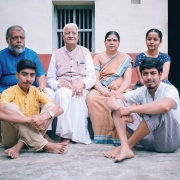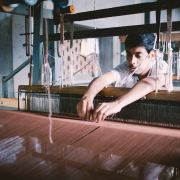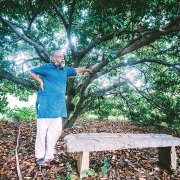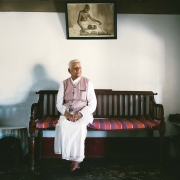
People
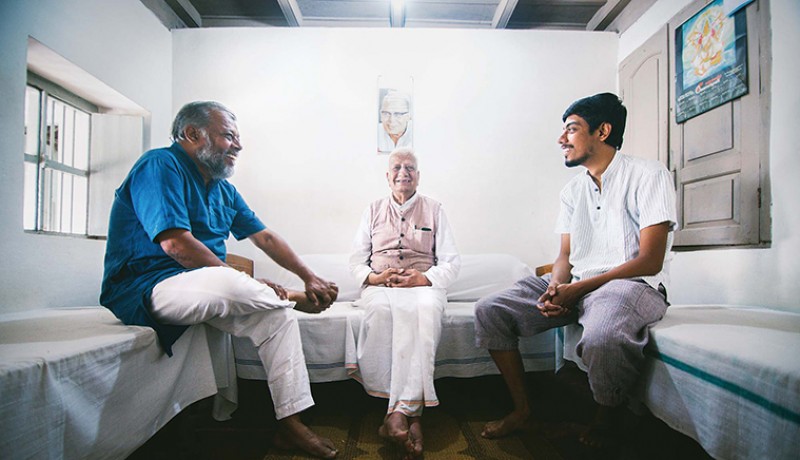
Saritha Rao Rayachoti discovers different embodiments of sarvodaya in one family
It is late afternoon in the temple town of Melkote in Mandya District, Karnataka. The street leading to the Kalyani, the temple tank, is bustling with a herd of goats, children returning home from school, even a bike that emits a loud horn as it passes the home of the Koulagis: Surendra Koulagi, his late wife Girija, their son, Santosh, daughter-in-law Geetha, and grandchildren, Sumanas, Supraj and Suhasini.
For over 56 years, three generations of the Koulagi family and their friends have risen to meet need-based challenges in society through the Janapada Seva Trust, a voluntary organisation that has propagated the Gandhian values of self-sufficiency, sustainability and sarvodaya (‘upliftment for all’) with little dependence on the government.
The most intriguing aspect of my visit is the discovery that each generation of this family has paved its own path through the social challenges that define its times and, in the process, discovered Mahatma Gandhi and his ideals.
Surendra Koulagi, 82, impeccably dressed in khadi, has just returned home from a visit to Mysuru, which is 50 km away, but wears his age lightly. Sitting in the jaguli or veranda, the octogenarian speaks of other journeys. “After my matriculation in the 1950s, I went to Bombay in search of a job. I worked for an advocate, typing up his cases. There, I met Dinshah K Mehta, a naturopath and close associate of Gandhiji. Many freedom fighters of that time used to visit the Nature Cure Clinic for rest or treatment and, there, I came in contact with Jayaprakash Narayan.”
This was a momentous meeting that would change the course of not only Surendra Koulagi’s life, but those from disadvantaged backgrounds whom he has rehabilitated, as well as two generations of his own family, chief among them his son Santosh and grandson Sumanas.
Surendra Koulagi went to work for freedom fighter and social reformer Jayaprakash Narayan between 1954 and 1959. “Though it was a short period, it was very educative. I was a servant, secretary, typist. I also used to make his bed. I helped in cooking and cleaning the vessels for his wife Prabhavati.”
He travelled extensively with Jayaprakash Narayan, but longed to work independently in a village. “I had already imbibed the principles of Gandhiji, Jayaprakash Narayan and Vinoba Bhave, so it was an urge in my mind to select a village to work in. I chose Melkote because, at that time, it was famous for its handloom industry.” The need of the hour, however, was different.
“India lives in her seven hundred thousand villages”
—Mahatma Gandhi
At the time the Janapada Seva Trust began in 1960, Surendra Koulagi found there were no facilities in rural India for disabled children, especially those affected by polio. So, in 1963, he started a residential facility in Melkote called Karunagruha with children from states like Tamil Nadu, Andhra Pradesh and even distant Gujarat.
“Karunagruha was housed in a country-tiled, humble structure with no electricity and no cement flooring. There was only a front door and windows. From the beginning, I felt there was no need for separate schools for these children; they must move within larger society and society must also accept them. The children travelled to the government school in a bullock cart.”
In the 1990s, the success of the polio eradication campaign implemented by the Indian Government led to fewer incidences of the disease. There were also government initiatives now available for children with disabilities. There was no longer a need for a residential facility like Karunagraha.
“We thought the infrastructure must be used for some social cause,” says Surendra Koulagi. “The government also wanted good volunteer organisations to take care of abandoned children in the district, so we started an adoption centre in 2010. About 30-40 children have been placed in families.”
Surendra Koulagi’s pride is palpable when he talks about a recent reunion of the children of Karunagruha. “They are now all grown-up, married, some are even grandfathers! When they came to Karunagraha as children, they were barely six years old!” The Trust also recently organised a get-together of the families where children from the adoption centre have been placed.
Over the years, other initiatives started by Janapada Seva Trust include a condensed education course for women who had discontinued their studies to complete the SSLC exam, a primary school, a pre-university college, a printing press for destitute women, and summer camps for children in and around Melkote.
Today, Surendra Koulagi is president of the Karnataka Sarvodaya Mandal and is often invited to share his wisdom and insights on applying Gandhian thoughts and ideas to solve problems in today’s society, which he also shares in the magazine he publishes called Janapada Vichara. Among the numerous accolades for his service to society, the Jamnalal Bajaj Award for Outstanding Contribution in the field of Constructive Work was conferred on him in 2014.
The activities of the Janapada Seva Trust are managed by Surendra Koulagi’s son, Santosh, who is also the secretary, along with support from friends and other members of the Trust, like Sheelavath, K Manu, Dr Manohar, Ramesh, and president of the Trust C S Janardhan.
“Our trust has got many activities, and I am directly or indirectly involved in them,” says Surendra Koulagi. “My son and my grandson are managing and taking Janapada Seva Trust forward with innovative ideas. I just admire, give encouragement, appreciate, and bless. That is my role now.”
“To forget how to dig the earth and to tend the soil is to forget ourselves”
—Mahatma Gandhi
Santosh’s journey is different from his father’s, but no less fascinating. When he was in fifth grade, his father sent him to Bengaluru to live with his uncle. He spent about 12 years there, and returned to Mysuru to study engineering. A Japanese farmer was instrumental in life taking a different turn for Santosh.
“In the 1980s, there were pro-people movements in Karnataka,” says 55 year-old Santosh. “People were talking about ecology and the environment. Masanobu Fukuoka’s book One-Straw Revolution made a big impact on all of us. It was a new concept and a very different kind of book. We thought it talked about technology of agriculture but it was more about life and philosophy.” He adds wryly, “We wanted to get rid of Gandhi, but Fukuoka says in his last page that his was a Gandhian way of farming.”
At that time, there were only a few magazines in Kannada and even a small piece in a Kannada publication reached many people, shares Santosh. “I wrote an article about Fukuoka but did not expect to receive such a response for it. That was a turning point in my life and Fukuoka was a major inspiration for me to stay back in Melkote.” Such was the influence of Fukuoka’s book that Santosh also translated it into Kannada as Ondu Hullina Kranthi and became actively involved in the farmers’ movements of the time. “Back then, coming from the city, we didn’t know much about agriculture. The only thing we knew was to criticise the short-sightedness of the agriculture department and the Green Revolution. But it did bring about a very big movement in Karnataka and people started organic farming.”
A piece of land originally purchased for the children of Karunagruha to grow vegetables was transformed into a centre for learning about non-violent, sustainable living alternatives called Hosa Jeevana Daari (‘a new way of life’). The campus is used for seminars and workshops by non-traditional schools as well as colleges and institutions like Nagarjuna College from Bengaluru, which aims to give its students an insight into alternative lifestyles that may be far removed from their own. And for 13 years, the Trust organised a five-week experiential programme on rural India, development issues and the environment for a student group called the Edinburgh Global Partnership from the University of Edinburgh.
“A lot of the younger generation is becoming part of our work and that is a big hope,” says Santosh. “We want them to think about alternatives to the current lifestyle; we should be critical about mainstream society.”
In 2009, the Trust also began Nene Bana (‘a forest of reminiscence’) that attempts to revive a 10-acre piece of land into a forest and nursery for native tree species that have gradually become endangered over the years. Around the same time, in the premises of Hosa Jeevana Daari, the Trust began a khadi unit, which is at the heart of the work of Santosh’s son, Sumanas.
“Khadi is the sun of the village solar system”
—Mahatma Gandhi
With an improvised wheel spinning yarn in the background, and the clacking sound of looms, the 24 year-old narrates the turning point in his young life. “Some of our visitors here—naturalists and wildlife biologists—used to take me to Melkote Wildlife Sanctuary nearby. It is a protected area for the grey wolf. I was very passionate about wildlife and wanted to get into conservation. When I went to Oxford for my master’s in biodiversity conservation, the programme was more holistic and I began to understand that I just can’t conserve wildlife in national parks. Everything is connected, from economics to philosophy. Unless we redefine the idea of development and well-being, it is not possible to save wildlife.”
Sumanas began to appreciate khadi and Gandhi’s thinking behind it, even using it as a case study for his PhD. Along with some friends, he is now infusing new ideas into what is essentially an old weaving process. The khadi weaving and dyeing unit at Hosa Jeevana Daari uses hand-spun yarn to weave yardage, saris, dhotis, dupattas, stoles, towels and handkerchiefs. They also have a tailoring unit that sews garments from kurtas to quilts and uniforms.
Sumanas’ focus is that weavers must get a fair compensation for the work they do. This has drawn to the unit more people who want to weave for a living—a marked difference to the situation in the beginning, with young weavers moving away from the craft perfected over the generations by their forefathers. Further, he is emphatic that there is such a thing as a maximum scale after which efficiency goes down. “We have only 11 looms but people come every day and want to join. If someone is interested and are willing to do their own thing, we can guide and support them. It should be a model where people can come and see and are able to do it themselves.”
“To me I seem to be constantly growing. I must respond to varying conditions, and yet remain changeless within”
—Mahatma Gandhi
Today, while the Janapada Seva Trust primarily runs the adoption centre, the native forest initiative, the khadi unit and the resource centre for sustainable living alternatives, what sets it apart is its ability to adapt to the needs of the times and ensuring that growth is at a modest pace.
“Scaling up activity was not at all a priority for Janapada Seva Trust,” affirms Santosh. “Only if we are small can we be flexible and experiment with alternatives. What we want most of all is to stay relevant.” While this calls for some agility on the part of the Trust, the one constant that guides their work is Gandhi and his compelling thoughts and ideas on subjects like self-sufficiency, sustainability and social development.
“You can make lot of comments on Gandhi over a cup of coffee,” says Santosh, “but if you really try to do something serious in your own field, you really can’t escape from, or ignore Gandhi. The three generations in my family, we started admiring Gandhi because of that.” Sumanas, perhaps, articulates it best when he says, “My grandfather, my father and myself…we look at Gandhi from different perspectives. When he started, my grandfather was more into traditional Gandhian ideas. My father found that Fukuoka mentions in his book about being inspired by Gandhi and Gandhian ideas. He discovered Gandhi through agriculture. In spite of coming from such a background, I had never seen Gandhi in a traditional perspective. I used to think that what my father and grandfather were saying was completely insane—in the age of computers they were talking about charkhas. I discovered Gandhi through the perspective of ecology and the environment and that’s why I moved into khadi.”
As I leave Melkote, I take in the rapidly passing fields and villages in the gloaming—that transient time between sunset and nightfall, where the fleeting light of day meets the first tinge of inky night—and marvel at the timeless, lasting impact of one man’s inquiries into the self and society.
Photographs by Sumukh Bharadwaj Featured in Harmony — Celebrate Age Magazine October 2016
you may also like to read
-
For the love of Sanskrit
During her 60s, if you had told Sushila A that she would be securing a doctorate in Sanskrit in the….
-
Style sensation
Meet Instagram star Moon Lin Cocking a snook at ageism, this nonagenarian Taiwanese woman is slaying street fashion like….
-
Beauty and her beast
Meet Instagram star Linda Rodin Most beauty and style influencers on Instagram hope to launch their beauty line someday…..
-
Cooking up a storm!
Meet Instagram star Shanthi Ramachandran In today’s web-fuelled world, you can now get recipes for your favourite dishes at….



